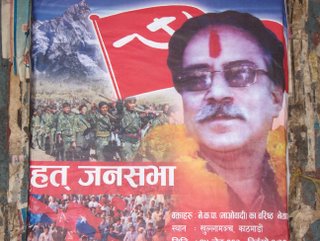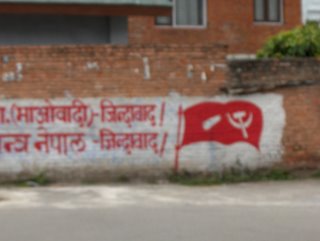Thanks Naag for the link to this story. Here's the latest from Thomas Marks. Nepal: Hope is Not a Method
By Dr. Thomas A. Marks
As Nepal moves towards a new order, its governing parliamentarians would do well to heed that most fundamental of maxims: hope is not a method.
To date, events have gone reasonably smoothly, but there continue to be ominous signs that a rougher road lies ahead. Not least of the elements for concern is what has been at the heart of the matter all along: the motives of the Maoist insurgents.
Contrary to much ill-considered opinion, the Maoists have not opted for peace in our time. Instead, their forces remain intact, even as they encourage the Government to dismantle the only surviving force that stands between the Communist Party of Nepal – Maoist (CPN-M), and its ability to work its will, the security forces.
Their grudging moves towards negotiations notwithstanding, the Maoists have been very consistent. In their verbiage, in their briefings to their cadres, and even in their interviews given to members of the international media, they make clear that they do not accept the present state of things and remain convinced that they are riding the “will of history” that will see the complete ouster of the old order.
The Maoists view the present course of the Seven Party Alliance (SPA) as an error of major proportions and are fearful that ‘the people’ will be ‘betrayed’. They certainly do not accept parliamentary democracy as the end-state, unless it emerges in a form of which they approve.
What stands behind their present tactical maneuvering is a willingness to go with the flow so long as the river does not leap its banks. If the SPA will do the work that armed rebellion could not accomplish – especially, dismantle the security forces and do away with even a figurehead monarchy – that is agreeable. But one cannot expect them, if things do not go their way, simply to shrug and say they had their moment.
There is a veritable cottage industry of historical falsification abounding, in Nepal and abroad, producing the fiction that the Maoists turned to insurgency only because they were not allowed to participate in 1991 parliamentary elections (as Masal). That is false. The machinations that led to one wing of Masal being allowed to run using party identification were an intra-Masal squabble, not something the system engineered. Likewise, the outrageous claim that the monarchy is somehow responsible for the violence of the Maoists is as astonishing as it is absurd. The Maoists first systematically laid waste to Nepal and its weak democracy, then systematically carried out a campaign to claim the reigning monarch had killed his brother and engineered what they, the Maoists, had in fact done – destroy Nepal. Having turned to armed insurgency, CPN-M methodically destroyed the structure of the state, in the process eliminating all who opposed the local presence of the Maoists. Having gained control of widespread areas, which they will continue to control during any proposed ‘elections’, they are not about to allow their rivals to freely contest within ‘liberated space’.
This is classic “machine politics”, as the Maoists claim the Nepal Congress (NC) and Communist Party of Nepal – United Marxist Leninist (CPN-UML, or simply UML) have been playing all these years. Since UML buys into this logic, at least partially, it is willing to front for the Maoists. The extremist wing of the UML does more than front – it works with the Maoists.
I
ronically, anti-communist India has ended up letting its own Marxists have their moment by unduly influencing New Delhi's Nepal policy. This should not surprise, given the realities of coalition politics.
With its dependency on the Left Front, particularly the Communist Party of India Marxist (CPI-M) in Parliament, compounded by divisions within its own ranks as to the proper policy towards Nepal, the Congress-led Government has acceded to the CPI-M demands. As a consequence, CPI-M figures such as Sitaram Yechury have become regular visitors to Kathmandu as they conduct the Indian Left’s ‘foreign policy within a foreign policy’.
The issue of Indian policy or intervention is not one that need detain any analysis at this moment. It will ultimately be decided, one way or another, as it was in Sri Lanka, by nationalism in the target state. Nepali nationalism, to be sure, is something which has rarely reared its head in anything save platitudes about “never having been a colony”. In fact, Nepal is as thorough a colony as ever there was (of India and of the international community through its utter dependence upon external aid).
Still, to be clear: first, India has no desire to become bogged down in the Nepalese quicksand, so having ‘democratic allies’ in power is the proper route to realization of its geo-strategic designs; second, there is a strong wing of Indian politics that sees the present policy towards Nepal as misguided, counterproductive, and downright dangerous, given India’s own Maoist threat. The claim that there are no connections between the Nepali and Indian Maoists is falsified by a wealth of evidence, not least the pronouncements and actions of the Nepali Maoists before they became more media savvy. The threat to Nepali sovereignty, then, is not from India per se but from the present situation that India has ‘enabled’. Its view is that it can ‘handle’ the situation. This remains to be seen – just as India proved quite incapable of ‘handling’ the Tamil insurgents in Sri Lanka.
The most pressing danger, at this juncture, is that SPA, dominated by NC and UML, will revert to form (on full display during the dozen or so years of full democracy) and lead Nepal into a ‘Kerensky moment’ for the Maoists, as occurred with the Bolsheviks in Russia in 1917-18. The Leninists were not the strongest party in post-Czarist Russia, only the party with a preponderance of force at the decisive point(s). This allowed them to gain control of the state and then to do what was necessary to consolidate their hold. This is also how Hitler consolidated his hold on Germany, despite having only one-third of the Parliament (Reichstag). It is what the Sandinistas did in post-Somoza Nicaragua. One already sees the Maoist thugs threatening even UML politicians (who, in any case, have always been on the cutting-edge as victims of the Maoists). What all the cases preceding cases share is that the security forces had fallen apart.
This is not yet the case in Nepal. The key, therefore, is to make the new-order understand that the security forces have every intention and desire to serve democracy – and that they will not stand by and see restored democracy and Nepali sovereignty compromised.
The Maoists, however, have stated repeatedly that they have other goals: trials for those central to the old-order, especially for the monarch and the Royal Nepal Army (RNA) officer corps (the Maoist leadership has asserted both of these goals in its less guarded moments). This is also what they have been saying to their cadres.
They have rejected integration into the Royal Nepal Army (RNA) by any name and demanded a new force, which they will dominate by default. This is just how the scenario played itself out in Nicaragua, the result being the Sandinista dictatorship, which rapidly produced its own counterrevolutionary insurgency by abusing the people. (Contrary to the hoary left-wing myth, the CIA could not even arm all the contras, so abundant was the influx of peasant manpower demanding the right to resist the Managua Marxist-Leninist dictatorship). In this situation, what is both puzzling and counterproductive is how little realistic consideration has emerged concerning the future of the security forces, of which the RNA is the dominant element. This is puzzling, because the security forces are quite intact and – contrary to yet another theme pushed by both activist elements of the new regime and their international activist backers – exercised remarkable restraint during the recent mass agitation. Lathi charges and rubber bullets are not semiautomatic volleys, and the latter did not occur.
There are at least 150,000 armed Government security forces in completely intact units. It is naïve to assume that they are going to march off to oblivion, surrender, or slaughter. The last two options are what the Maoists envisage, and what they expect to extract from the ruling SPA as their price for ‘nonviolent participation’ in the state. To judge that this inevitably will lead to confrontation requires no analytical acumen – simply looking at the Nepali security forces with clear eyes.
What is now on the field is a force quite different from that which entered the conflict in November 2001, when the RNA was attacked by the Maoists. This is especially so in the key middle grades and extending even to the younger brigadiers. It is also true in the Armed Police Force (APF), perhaps to a lesser extent in the Nepal Police (NP). The RNA’s ‘field elements’ now accept parliamentary supremacy and seek a more professional, ‘21st Century military’. Officers know there are numerous friendly states with extensive experience in implementing and consolidating the proper mechanisms. Many of these younger RNA officers have even considered the passing of the monarchy, but they are worldly enough to see that this leaves open the question of what institution or figure would serve the referee's position. Hence, they believe it is preferable that a constitutional monarchy remain. What they do not accept is the position demanded by the Maoists and their left wing allies: ‘replacing’ one force by another, or of ‘purging’ one force only to install the cadres of another. Reconciliation, to their mind, demands amalgamation, even if this is accompanied by reduction in overall numbers. Under no circumstances will any force accept being disbanded in favor of Maoist replacements. To do so would guarantee left-wing dictatorship.
For their part, APF and NP are critical to the normal law and order of the state. Ironically, whatever the precise manner in which events unfold, the sitting Government is bound to find, in the months ahead, normal policing and security duties will assume heightened importance. A clear understanding must be worked out by the Government as to what is expected to arrest a dangerous societal drift that has set in. Armed thugs, often claiming to be representing ‘the people’ but invariably cadres of Maoist front organizations, roam all major population centers in Nepal and must be brought within the normal rule of law.
This is a job particularly for the Police, supported by the APF, but it is inevitable that RNA will be involved. The present situation, including the widespread intimidation of individuals and institutions, cannot go unchecked.
Politically, RNA is confronted with a Faustian bargain: It must serve the state even with the knowledge that the unity of SPAM (Seven Party Alliance + the Maoists) depends upon the SPA placating the Maoists. The Maoists see the victory as theirs and see themselves as dictating the terms of surrender – and envisage only trials for those who have resisted them. Hence, the security forces must keep order even as they are plotted against (in certain circles) and held up as a bargaining chip (in others).
Their logical advocates, the Indians, who have the most to lose from a Maoist-dominated Nepal, remain very much an unknown element, given the array of actors waging mini-foreign policies. One factor has not changed as any perusal of large segments of the Indian press reveals: New Delhi has been ill-informed by a good fraction of its so-called ‘Nepal experts’, in just the manner it was led astray, two decades ago, by its ‘Sri Lanka experts’. It cannot be said that Indian analysts have developed much actual knowledge of the workings of Nepali Maoism. The dominant position is that the CPN-M can be bought off or simply directed – an astonishing position given what India seems to have realized quite belatedly the Stalinist, anti-democratic essence of its own Maoists. The CPI-M, in particular, has little comprehension of Nepali insurgent ground realities. The Indian Left Wing political pilgrims to Nepal deal with their opposite numbers in the UML. If they meet a ‘Maoist’, they deal with personalities of their ‘own stratum’, who can be as engaging and sophisticated as any. They do not deal with what is in the hills, thus gaining no comprehension that there is an organization of LTTE clones, every bit as dogmatic and ruthless.
For those who have dealt with the Tamil insurgents, one conclusion is salient: the orientation of manpower is never the issue in a situation such as this. It is leaders who are the lynchpin, who produce the endless cycle of insurgent brutality in Sri Lanka, a struggle that has long since seen its original causes vanish. The situation in Nepal is similar. It is the Maoist leaders who are following an ideological play-book; their followers are thrown up by local grievances. Maoist manpower is just as eager for ‘peace’ as anyone else, but they expect to get something out of their campaign. They have been told consistently that the new order will belong to them and will bring justice and prosperity. There is no way to do that in the short term except by taking from the old and giving to the new.
That this is playing a losing hand has been made clear in study after study, most recently by the simple but telling calculations of Dr. Steve Gorzula. As he notes: divide the arable land of Nepal (22,627 km2) by the population (28 million in July 2006 estimates), and the result is a society that has exceeded the carrying capacity of the land. Lip-serve is paid to the only real possibility – development of hydropower – and the result is a vacuum in which Maoist coercive utopian solutions have no competitors.
Lenin would certainly be proud of his Maoist pupils. On the side of democracy, however, there is little worthy of praise. The stormy course ahead will require more steady seamanship than has hitherto been demonstrated in the short history of Nepali democracy. More than ‘hope (it all works out)’ will be required.
The role of the security forces will be paramount, for they are the only guarantee that Maoist violence will not be the trump card. Thus normal functioning of those security forces will have to be maintained at all costs, so as to avoid demoralization and possible desertion. Clear explanations of what is happening are imperative, with the emphasis upon ‘transition to parliamentary supremacy’. Any impression of ‘defeat’ must be banished, despite the concerted efforts of the Left Wing to push this claim in the ongoing struggle for control of the narrative describing recent events. Already, the Maoists claim their revolutionary forces were the key in the recent agitation (their cadres did incite violence and cache explosives in urban areas).
‘Reform’, then, must be the order of the day, as has long been called for by all interested parties, but this word finds no place in the Maoist vocabulary. Consequently, forces of actual democracy (as opposed to ‘people’s democracy’) will be called upon to face the inevitable backlash. It is for the politicians to deal with this reality, and the security forces can be their shield. It is possible that international mediation and even involvement may create new possibilities. For the moment, however, the Maoists have no intention of participating in a new version of the old-order. They are demanding and expecting that a constitutional convention will deliver a people’s republic in form if not in immediate practice. They are determined to exact vengeance.
They are not, in other words, seeking ‘democracy’ as we know the word. There is a strong thread of thought which claims the Maoists will choose the path trod by the ‘other’ insurgent groups in Sri Lanka (e.g., PLOT, TELO, EPRLF), groups that agreed, with certain misgivings, to work within the system. More likely, the Maoists will go the way of the LTTE that, after each hopeful pause, resumed its revolutionary project.
It hardly needs highlighting that such a course of action by the Maoists would put them squarely at odds with the desires of the Nepali masses – just as LTTE cannot today be said to represent much more than the aspirations of its rump state. If the CPN-M is astute, it will realize this. Unfortunately, history does not provide grounds for optimism. There is no Maoist insurgency that has displayed such foresight. Neither do operational realities provide any more hope: the Maoists are not in any way standing down.
The up side? If the Maoists move as driven by their hate-filled ideology and resume their struggle, they will find themselves just where LTTE is – on the wrong side of history and facing a reasonably united, democratic society, amply assisted by friendly powers, including India.
This article was first published in South Asia Intelligence Review
(Dr. Thomas A. Marks is Professor of Insurgency, Terrorism and Counter-Terrorism at the School of National Security Executive Education (SNSEE) of the National Defense University (NDU) in Washington, D.C.)







